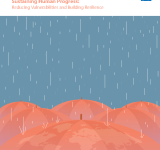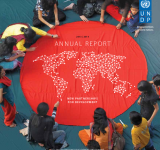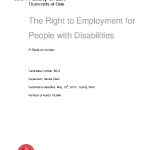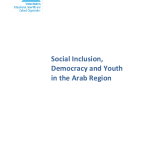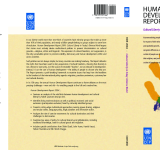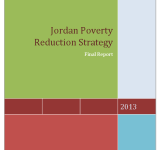inclusion
صدر هذا التقرير عن برنامج الأمم المتحدة الإنمائي الذي يدعم التقدم المستدام والشامل والذي يصمد أمام التحديات في كل أقاليم العالم النامي الخمسة. ويسلط هذا التقرير السنوي لعام 213-214 الضوء على نتائج
تبحث هذه الدراسة في مدى تطبيق القوانين الدولية لحقوق الإنسان والتشريعات في محاولة للإجابة على السؤال البحثي الرئيسي: لماذا الأشخاص ذوي الإعاقة في الأردن يجدون صعوبة في الحصول على عمل؟. فهذه الدراسة
"تهدف هذه الدراسة، كجزء من برنامج اليونسكو الدولي الحكومي لإدارة التحولات الاجتماعية إلى زيادة المعرفة المتعلّقة بإدماج الشابات والشبّان اجتماعيًا وسياسيًا في الدول العربية بالاستناد إلى تجارب سابقة
إن هذا التقرير المسحي/الاستقصائي من احد مكونات دراسة "التضمين المالي العالمي على اوسع نطاق". حيث استخدم لقياس كيف يقوم الناس بالتوفير – يشمل الفقراء، النساء، وسكان المناطق الريقية -، الإقتراض، وكيفية
Accommodating people's growing demands for their inclusion in society;; for respect of their ethnicity;; religion;; and language;; takes more than democracy and equitable growth. Also needed are multicultural policies that recognize differences;; champion diversity and promote cultural freedoms;; so that all people can choose to speak their language;; practice their religion;; and participate in shaping their culture—so that all people can choose to be who they are. In recent years the Human Development Report has argued strongly that this is as much a question of politics as economics—from protecting human rights to deepening democracy. Human development is first and foremost about allowing people to lead the kind of life they choose—and providing them with the tools and opportunities to make those choices. The 2004 Report builds on that analysis;; by carefully examining—and rejecting—claims that cultural differences necessarily lead to social;; economic and political conflict or that inherent cultural rights should supersede political and economic ones. Instead;; it provides a powerful argument for finding ways to “delight in our differences”;; as Archbishop Desmond Tutu has put it. It also offers some concrete ideas on what it means in practice to build and manage the politics of identity and culture in a manner consistent with the bedrock principles of human development.
The Government of Jordan adopted its first Poverty Alleviation Strategy in 2002 recognizing poverty as a key development problem requiring a comprehensive policy for improving the lives of the poor and socially excluded;; increasing their human capabilities;; providing them with economic opportunities and fully integrating them in the society. Considerable progress in poverty reduction has been achieved. The Government has put in place a series of social programs aimed at increasing employment opportunities;; curbing unemployment;; combating poverty and offering in-kind and cash assistance for the poor and marginalized groups within Jordanian society
